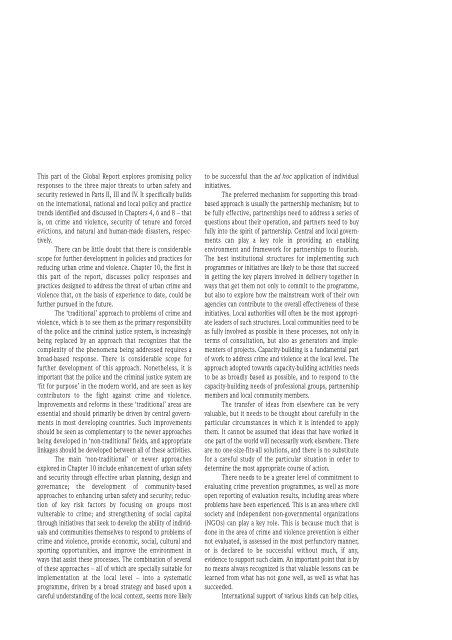Global Report on Human Settlements 2007 - PoA-ISS
Global Report on Human Settlements 2007 - PoA-ISS
Global Report on Human Settlements 2007 - PoA-ISS
Create successful ePaper yourself
Turn your PDF publications into a flip-book with our unique Google optimized e-Paper software.
This part of the <str<strong>on</strong>g>Global</str<strong>on</strong>g> <str<strong>on</strong>g>Report</str<strong>on</strong>g> explores promising policy<br />
resp<strong>on</strong>ses to the three major threats to urban safety and<br />
security reviewed in Parts II, III and IV. It specifically builds<br />
<strong>on</strong> the internati<strong>on</strong>al, nati<strong>on</strong>al and local policy and practice<br />
trends identified and discussed in Chapters 4, 6 and 8 – that<br />
is, <strong>on</strong> crime and violence, security of tenure and forced<br />
evicti<strong>on</strong>s, and natural and human-made disasters, respectively.<br />
There can be little doubt that there is c<strong>on</strong>siderable<br />
scope for further development in policies and practices for<br />
reducing urban crime and violence. Chapter 10, the first in<br />
this part of the report, discusses policy resp<strong>on</strong>ses and<br />
practices designed to address the threat of urban crime and<br />
violence that, <strong>on</strong> the basis of experience to date, could be<br />
further pursued in the future.<br />
The ‘traditi<strong>on</strong>al’ approach to problems of crime and<br />
violence, which is to see them as the primary resp<strong>on</strong>sibility<br />
of the police and the criminal justice system, is increasingly<br />
being replaced by an approach that recognizes that the<br />
complexity of the phenomena being addressed requires a<br />
broad-based resp<strong>on</strong>se. There is c<strong>on</strong>siderable scope for<br />
further development of this approach. N<strong>on</strong>etheless, it is<br />
important that the police and the criminal justice system are<br />
‘fit for purpose’ in the modern world, and are seen as key<br />
c<strong>on</strong>tributors to the fight against crime and violence.<br />
Improvements and reforms in these ‘traditi<strong>on</strong>al’ areas are<br />
essential and should primarily be driven by central governments<br />
in most developing countries. Such improvements<br />
should be seen as complementary to the newer approaches<br />
being developed in ‘n<strong>on</strong>-traditi<strong>on</strong>al’ fields, and appropriate<br />
linkages should be developed between all of these activities.<br />
The main ‘n<strong>on</strong>-traditi<strong>on</strong>al’ or newer approaches<br />
explored in Chapter 10 include enhancement of urban safety<br />
and security through effective urban planning, design and<br />
governance; the development of community-based<br />
approaches to enhancing urban safety and security; reducti<strong>on</strong><br />
of key risk factors by focusing <strong>on</strong> groups most<br />
vulnerable to crime; and strengthening of social capital<br />
through initiatives that seek to develop the ability of individuals<br />
and communities themselves to resp<strong>on</strong>d to problems of<br />
crime and violence, provide ec<strong>on</strong>omic, social, cultural and<br />
sporting opportunities, and improve the envir<strong>on</strong>ment in<br />
ways that assist these processes. The combinati<strong>on</strong> of several<br />
of these approaches – all of which are specially suitable for<br />
implementati<strong>on</strong> at the local level – into a systematic<br />
programme, driven by a broad strategy and based up<strong>on</strong> a<br />
careful understanding of the local c<strong>on</strong>text, seems more likely<br />
to be successful than the ad hoc applicati<strong>on</strong> of individual<br />
initiatives.<br />
The preferred mechanism for supporting this broadbased<br />
approach is usually the partnership mechanism; but to<br />
be fully effective, partnerships need to address a series of<br />
questi<strong>on</strong>s about their operati<strong>on</strong>, and partners need to buy<br />
fully into the spirit of partnership. Central and local governments<br />
can play a key role in providing an enabling<br />
envir<strong>on</strong>ment and framework for partnerships to flourish.<br />
The best instituti<strong>on</strong>al structures for implementing such<br />
programmes or initiatives are likely to be those that succeed<br />
in getting the key players involved in delivery together in<br />
ways that get them not <strong>on</strong>ly to commit to the programme,<br />
but also to explore how the mainstream work of their own<br />
agencies can c<strong>on</strong>tribute to the overall effectiveness of these<br />
initiatives. Local authorities will often be the most appropriate<br />
leaders of such structures. Local communities need to be<br />
as fully involved as possible in these processes, not <strong>on</strong>ly in<br />
terms of c<strong>on</strong>sultati<strong>on</strong>, but also as generators and implementers<br />
of projects. Capacity-building is a fundamental part<br />
of work to address crime and violence at the local level. The<br />
approach adopted towards capacity-building activities needs<br />
to be as broadly based as possible, and to resp<strong>on</strong>d to the<br />
capacity-building needs of professi<strong>on</strong>al groups, partnership<br />
members and local community members.<br />
The transfer of ideas from elsewhere can be very<br />
valuable, but it needs to be thought about carefully in the<br />
particular circumstances in which it is intended to apply<br />
them. It cannot be assumed that ideas that have worked in<br />
<strong>on</strong>e part of the world will necessarily work elsewhere. There<br />
are no <strong>on</strong>e-size-fits-all soluti<strong>on</strong>s, and there is no substitute<br />
for a careful study of the particular situati<strong>on</strong> in order to<br />
determine the most appropriate course of acti<strong>on</strong>.<br />
There needs to be a greater level of commitment to<br />
evaluating crime preventi<strong>on</strong> programmes, as well as more<br />
open reporting of evaluati<strong>on</strong> results, including areas where<br />
problems have been experienced. This is an area where civil<br />
society and independent n<strong>on</strong>-governmental organizati<strong>on</strong>s<br />
(NGOs) can play a key role. This is because much that is<br />
d<strong>on</strong>e in the area of crime and violence preventi<strong>on</strong> is either<br />
not evaluated, is assessed in the most perfunctory manner,<br />
or is declared to be successful without much, if any,<br />
evidence to support such claim. An important point that is by<br />
no means always recognized is that valuable less<strong>on</strong>s can be<br />
learned from what has not g<strong>on</strong>e well, as well as what has<br />
succeeded.<br />
Internati<strong>on</strong>al support of various kinds can help cities,

















